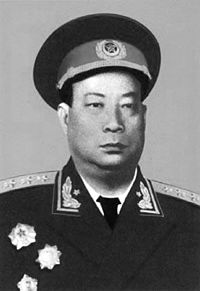He Bingyan
He Bingyan | |
|---|---|
| Hạ bỉnh viêm | |
 | |
| Commander of theChengdu Military Region | |
| In office May 1955 – 1 July 1960 | |
| Chairman | Mao Zedong |
| Succeeded by | Huang Xinting |
| Personal details | |
| Born | 5 February 1913 Yidu,Hubei Province,China |
| Died | July 1, 1960(aged 47) Chengdu,China |
| Political party | Chinese Communist Party |
| Awards |
|
| Nickname | “One-armed General” |
| Military service | |
| Allegiance | |
| Branch/service | |
| Years of service | 1930–1922 |
| Rank | |
| Commands | Commander of theShenyang Military Region |
| Battles/wars | Second Sino-Japanese War, Battle of Ping xing guan, Chinese Civil War, Korean War |
He Bingyan(Chinese:Hạ bỉnh viêm;pinyin:Hè Bǐngyán;5 February 1913 – 1 July 1960) was a colonel general in thePeople's Liberation Armyof the People's Republic of China fromHubei.He was known as the “one-armed General ( một tay tướng quân )” for his injuries suffered during theLong March.[1]
Biography
[edit]Early life
[edit]He Bingyan was born into a widowed family. After his mother's death, he changed his surname from “Hu” ( hồ ) to “He”, the surname of his father.[2]As a youth, he did many odd jobs, including being a porter, tailor and blacksmith. In 1929, he followed his father and joined theChinese Workers' and Peasants' Red Armyand was part ofHe Long’s security detail. He joined theChinese Communist Partyin June 1930. Upon graduation from the Hunan Hebei Red Army School in 1932, he was as the captain of an infantry brigade. He took part in the4th Encirclement Campaign[3]and was commended as the “model brigade” for assisting the 8th Division to break out of the Nationalist encirclement inJiangxi Soviet.[citation needed]
In October 1932, He Bingyan led the 3rd Red Army out of the Nationalist Encirclement. However, due to the internal “revisionist” and “left-lean” purges in 1933, he was jailed for a brief amount of time before being released byHe Long.[4]After his release, he was appointed as the Chief of the Recruit Brigade. In the same year, his father, He Xuewen died in battle atHefeng County.[citation needed]
In November 1935, he was named as the Commander of the 5th Division in the 2nd Red Army to lead the forces in theLong March.During a battle inSuining County, Hunan,He Bingyan was hit by a bullet in the arm which was amputated without anesthetic.[5]After rendezvous with the main army forces, he was sent toXi'anGuangren Hospital for treatment.[citation needed]
During the Second Sino-Japanese War
[edit]Following the outbreak of war, he was the commander of the 358th Brigade ofHe Long's 120th Division in theEighth Route Army.He initially led it in skirmishes and guerrilla attacks, like theAmbush of Yanmen Passon 18–21 October 1937, during theBattle of Xinkouin northernShanxi.In December 1938, he served as a detachment leader in the 120th Division, actively working withPolitical CommissarYu Qiulito expand the army's area of influence across the northern banks of theQing River.In winter, He Bingyan led a detachment intoJizhongand successively conducted battles in Lianzikou and Bei Biaoqiao, smashing a 3-layer encirclement by theImperial Japanese army.[2]
In 1940, He Bingyan was ordered to return to JinSuiBorder Zone to participate in theHundred Regiments Battle.He was subsequently appointed as the deputy commander of the 358th Brigade. He was then transferred toYan’anfor studies atCentral Party School of the Chinese Communist Party.[2]In November 1944, he was ordered to incite and establish an anti-Japanese base inHonghuand serve as the commander of the 3rd Division of theNew Fourth Armyin,Hubei,HenanandJiangxiprovinces.[6]
After the founding of the PRC
[edit]After the founding of thePeople's Republic of ChinaHe Bingyan became plagued with ill health and received long-term treatment.[7]He had lost his right arm, had received 11 injuries, 16 scars and suffered fromhigh blood pressure,arthritis,bronchial asthmaandkidney disease.[7][8]Despite these illnesses, he continued to work in theChinese army.[7]In 1955, he was awarded the rank of general.[8]Five years later, on 1 July 1960, He Bingyan died inChengdu.[8]
References
[edit]- ^""Một tay tướng quân" hạ bỉnh viêm, dư thu từng như thế nào mang ra "Thiên hạ đệ nhất quân" -- lịch sử Đảng kênh - nhân dân võng ".dangshi.people.cn.Retrieved2017-11-07.
- ^abc"Khai quốc thượng tướng kỷ niệm quán -- Trung Quốc Đảng Cộng Sản tin tức -- nhân dân võng".dangshi.people.cn.Archived fromthe originalon 2019-03-25.Retrieved2017-11-07.
- ^"Hạ bỉnh viêm -- Trung Quốc Đảng Cộng Sản tin tức -- nhân dân võng".dangshi.people.cn.Retrieved2017-11-07.
- ^Lôi tú trân (1991).Trung Quốc Đảng Cộng Sản lịch sử Đảng nhân vật giới thiệu.Trung Quốc nhân dân đại học nhà xuất bản. p. 131.ISBN978-7-300-01040-3.
- ^Âu Dương thanh (2011).Đại trao quân hàm: 1955 nước cộng hoà tướng soái trao quân hàm hồ sơ.Bắc Kinh: Trường thành nhà xuất bản. pp. 362–363.ISBN9787548300588.
- ^Khoa học quân sự viện quân sự thư viện (2000).Quân giải phóng nhân dân Trung Quốc toàn sử ( quân giải phóng nhân dân Trung Quốc tổ chức duyên cách cùng các cấp lãnh đạo thành viên danh lục ).Vol. Đệ thập cuốn ( hạ ). Bắc Kinh: Khoa học quân sự nhà xuất bản. p. 552.ISBN7801373154.
- ^abc"Hạ bỉnh viêm -- tư liệu trung tâm -- Trung Quốc Đảng Cộng Sản tin tức võng".People's Daily.
- ^abc""Một tay tướng quân" hạ bỉnh viêm: Không đánh thuốc tê tiệt đi cánh tay phải, Mao chủ tịch đặc phê "Không cần cúi chào" - tùng tư thị chính phủ nhân dân võng ".hbsz.gov.cn.Retrieved2022-01-11.
